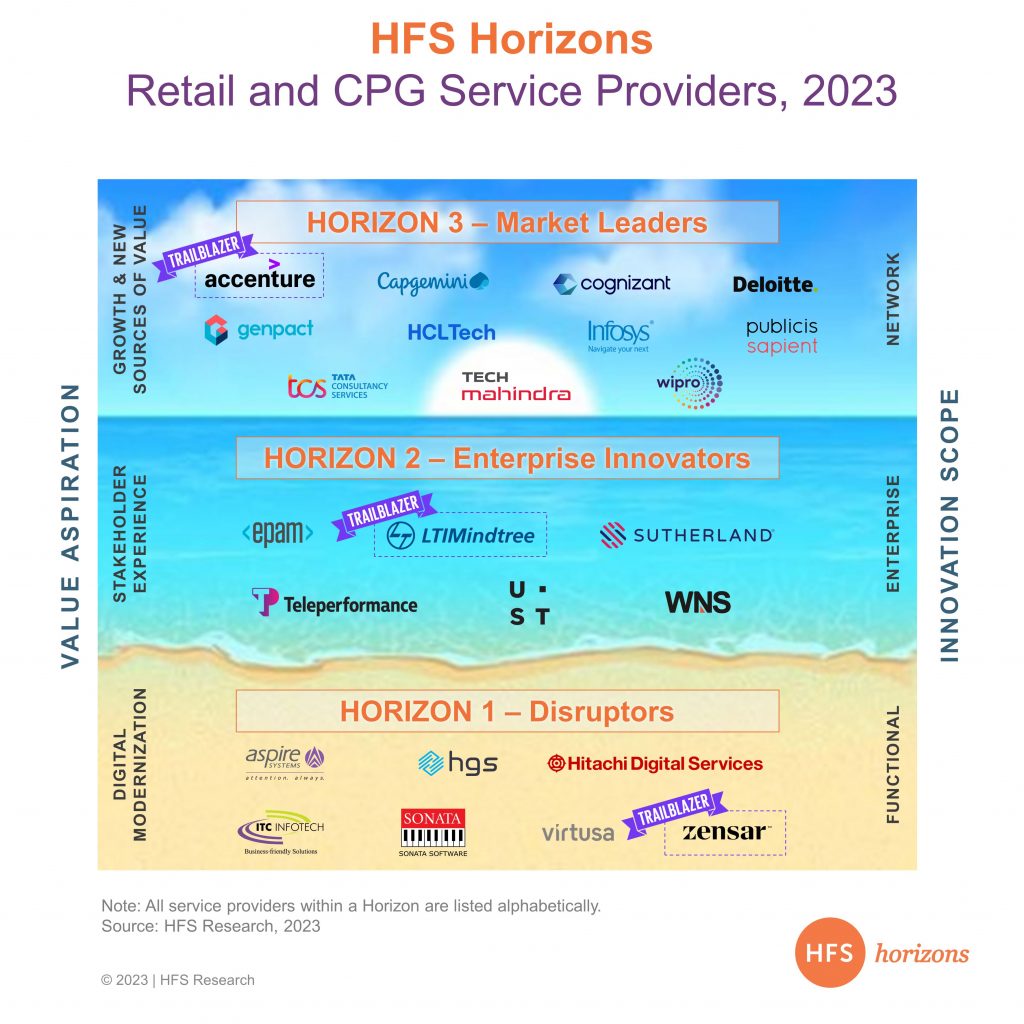Retailers and CPG firms have never had it so tough. They are grappling with increasing costs of raw materials, wages and rising interest rates, in addition to the rapidly changing tastes of typical shoppers exacerbating the situation further.
The new-age shopper is tech-driven, environmentally conscious, convenience-oriented, has heterogeneous personal tastes, considers that CX trumps pricing, and engages via new channels, such as social commerce. The double blow of increasing operational costs and heightened customer expectations has created this digital dichotomy where enterprises need to innovate but don’t have the budget. Therefore, they are engaging in innovation projects to combat the digital dichotomy to get more value without huge upfront investments.
CPG and retail firms are working on both unique and common initiatives
In these challenging times, CPG firms focus on areas like supply chain command center solutions, digital engagement platforms, direct-to-consumer channels as extensions to their existing retail channels, and optimizing supply chain performance to reach customers at never-seen-before speeds.
In comparison, retailers want to create a seamless and similar CX across all engagement channels, working on customer loyalty, collaborating with their vendor partners to combat any future supply chain disruptions, devising community-driven brand strategy underpinned by purpose and ethics, and formulating multi-channel hyper-personalized experiences throughout the customer lifecycle. Retailers and CPG firms have common goals, such as engaging in digital transformation initiatives involving re-designing operations, cloud migration, and change management.
According to the report’s lead author, Ashish Chaturvedi, “Retailers and CPG (RCPG) companies are embracing unified commerce to break down the barriers between channels, creating a seamless and integrated shopping experience. By combining the power of technology, data, and customer-centric strategies, service providers are helping RCPG companies forge new paths toward a future where convenience, personalization, and connectivity converge.”
There is a heterogenous provider landscape catering to CPG and retailer firms
The HFS Horizons: Retail and CPG Service Providers, 2023 report covers 24 leading providers helping their clients embrace innovation, devise new value streams, and realize value across three Horizons:
- Horizon 1 constitutes functional modernization by reducing costs, speed, and efficiency, for example, re-platforming a commerce platform or modernizing corporate functions such as F&A, sourcing, and procurement.
- Horizon 2 retains the values of Horizon 1 plus looks at transforming end-to-end retail and CPG services, creating unmatched stakeholder experience with a OneOffice™ mindset, for example, creating modern value-based supply networks.
- Horizon 3 encapsulates all values of the previous Horizons plus driving completely new sources of value with a OneEcosystem™ approach, for example, CPG firms adopting direct-to-consumer (DTC) sales model or retailers espousing unified commerce to boost topline.
The chart below summarizes the Horizons philosophy and key underlying dynamics, showcasing the providers across the three Horizons.
Note: All service providers within a “Horizon” are listed alphabetically
Starting with this Horizons report, HFS will showcase standout, best-in-class players called “Trailblazers.” Trailblazers exemplify the why, what, how, and so what assessment criteria, yielding truly exceptional value for enterprises and partners for a particular Horizon.
HFS’s CEO and Chief Analyst, Phil Fersht, commented on this development: “At HFS, we are never shy about trying out new things that will add more value to the overall exercise. The idea is to get as close to the real market landscape picture through our Horizons, and this is a step in that direction.”
Report highlights
- CPG and retail firms are building a data-driven technology spine: Retail and CPG firms are leveraging first-party data and analytics enhanced with GenAI. There are new avenues of digitization in the form of IoT (smart manufacturing), blockchain (tracking, tracing, and loyalty), cloud-native enterprise architecture (resilient and adaptable organization), and AR/VR (to improve the physical and digital storefront experience).
- Generative AI is the season’s flavor but lacks commitment: Although GenAI is the number one technology clients want to invest in, the innovation and transformation budgets for most firms are frozen or severely reduced owing to economic slowdown, rising inflation, and an increase in input costs. Moreover, current GenAI projects are experimental with a minimal committed dollar value attached.
- Retail 2.0 is “in the works”: There’s an increase in private labels, the store format is changing along with greater adoption of in-store tech, there’s stress on unified commerce, subscription and membership models are increasing to drive loyalty, circular economy initiatives are coming into the fray, and there’s an effort to discover data monetization avenues.
- CPG 2.0 is about value generation: Innovations in product formulations and packaging are striving for greater sustainability benefits. Localization and cultural relevance play a significant role in new product introductions. Technology integration has become a de-facto element of all transformation engagements. The spending on social media and influencer marketing is greater than ever.
- HFS assessed 24 leading service providers providing services to retail and CPG firms. Of these 24 providers, 11 are positioned in Horizon 3 as leaders, 6 in Horizon 2 as innovators, and 7 in Horizon 1 as disruptors.
- The services firms that lead the market and ecosystem-level change in Horizon 3 are Accenture, Capgemini, Cognizant, Deloitte, Genpact, HCLTech, Infosys, Publicis Sapient, Tech Mahindra, TCS, and Wipro.
- The service providers creating unmatched stakeholder experience with a OneOffice™ mindset in Horizon 2 are EPAM, LTIMindtree, Sutherland, Teleperformance, UST, and WNS.
- The services firms driving cost reduction, speed, and efficiency in Horizon 1 are Aspire Systems, HGS, Hitachi Digital Services, ITC Infotech, Sonata Software, Virtusa, and Zensar.
- The report includes detailed profiles of each service provider, outlining their capabilities, strengths, provider facts, and development opportunities.
HFS subscribers can download the report here.
Posted in : Customer Experience, Digital Transformation, HFS Horizons, Retail, Supply Chain, supply-chain-management







